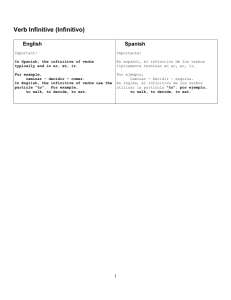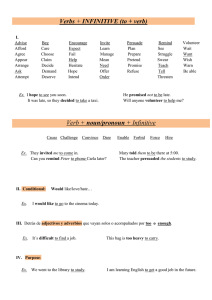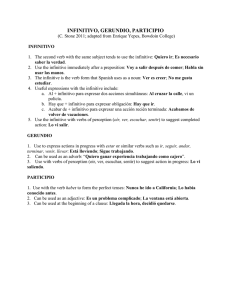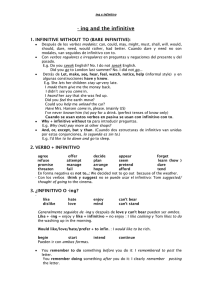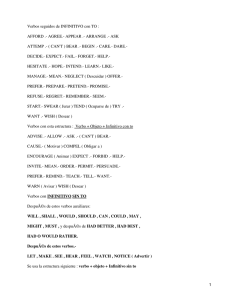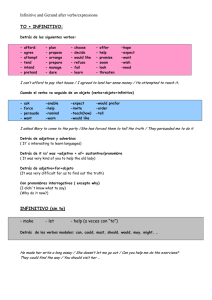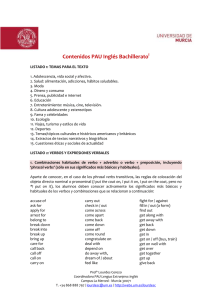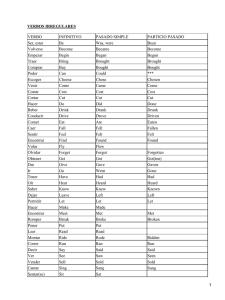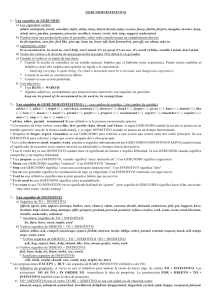infinitive gerundio - IES Sant Vicent Ferrer
Anuncio
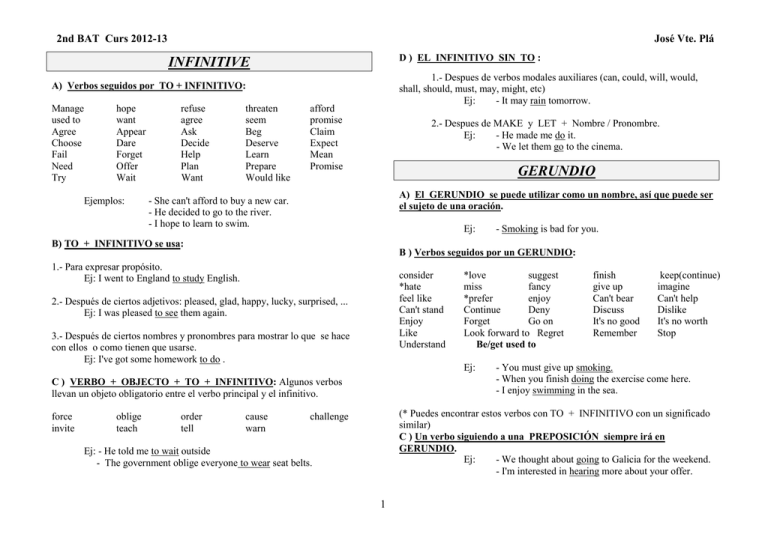
2nd BAT Curs 2012-13 José Vte. Plá D ) EL INFINITIVO SIN TO : INFINITIVE 1.- Despues de verbos modales auxiliares (can, could, will, would, shall, should, must, may, might, etc) Ej: - It may rain tomorrow. A) Verbos seguidos por TO + INFINITIVO: Manage used to Agree Choose Fail Need Try hope want Appear Dare Forget Offer Wait Ejemplos: refuse agree Ask Decide Help Plan Want threaten seem Beg Deserve Learn Prepare Would like afford promise Claim Expect Mean Promise 2.- Despues de MAKE y LET + Nombre / Pronombre. Ej: - He made me do it. - We let them go to the cinema. GERUNDIO A) El GERUNDIO se puede utilizar como un nombre, así que puede ser el sujeto de una oración. - She can't afford to buy a new car. - He decided to go to the river. - I hope to learn to swim. Ej: B) TO + INFINITIVO se usa: B ) Verbos seguidos por un GERUNDIO: 1.- Para expresar propósito. Ej: I went to England to study English. consider *hate feel like Can't stand Enjoy Like Understand 2.- Después de ciertos adjetivos: pleased, glad, happy, lucky, surprised, ... Ej: I was pleased to see them again. 3.- Después de ciertos nombres y pronombres para mostrar lo que se hace con ellos o como tienen que usarse. Ej: I've got some homework to do . oblige teach order tell cause warn *love suggest miss fancy *prefer enjoy Continue Deny Forget Go on Look forward to Regret Be/get used to Ej: C ) VERBO + OBJECTO + TO + INFINITIVO: Algunos verbos llevan un objeto obligatorio entre el verbo principal y el infinitivo. force invite - Smoking is bad for you. finish give up Can't bear Discuss It's no good Remember keep(continue) imagine Can't help Dislike It's no worth Stop - You must give up smoking. - When you finish doing the exercise come here. - I enjoy swimming in the sea. (* Puedes encontrar estos verbos con TO + INFINITIVO con un significado similar) C ) Un verbo siguiendo a una PREPOSICIÓN siempre irá en GERUNDIO. Ej: - We thought about going to Galicia for the weekend. - I'm interested in hearing more about your offer. challenge Ej: - He told me to wait outside - The government oblige everyone to wear seat belts. 1 2nd BAT Curs 2012-13 José Vte. Plá D ) Usaremos el GERUNDIO después de estas expresiones: - C) ALLOW ADVISE FORBID PERMIT CAN'T HELP: - I can't help thinking about the accident. CAN'T STAND: - I can't stand eating this soup. IT'S NO USE: - It's no use trying to persuade me. IT'S NO GOOD: - It's no good playing with guns. IT'S WORTH: - I think it's worth trying. DON'T MIND: - I don't mind looking after the children. WOULDN'T MIND: BE USED TO: - I'm used to reading a book a day. LOOK FORWARD TO: - I'm looking forward to seeing you. 1.- REMEMBER 2.- FORGET 3.- STOP 4.- GO ON D) + -ING se refiere a cosas que sucedieron antes. + -ING = enjoy Ej: I like walking in the rain. + INFINITIVE = elegir hacer; tener un hábito; creer que es correcto. Ej: I didn't like to disturb you. 2 - We don't allow smoking. - We don't allow people to smoke. - I advised taking the car. - I advised you to take the car. SEE WATCH HEAR + -ING = Cuando observamos parte de la acción. E) TRY + - ING = Hacer un experimento; hacer algo para ver qué sucede. + INFINITIVO = Hacer un esfuerzo; intento para hacer algo dificil. Ej: - I tried sending her flowers - Please, try to understand. F) BEGIN START + - ING + INFINITIVO No existe diferencia real de significado. * Pero nunca se pone - ING detras de una forma continua. Ej: I was beginning to get angry. * Begin / Start + understand y realize siempre toman el infinitivo. Ej: I begin to understand. + INFINITIVE se refiere a cosas que sucedieron despues. 5.- REGRET Ej: 1.- I don't remember playing in the garden. Remember to go to the post office. 2.- I'll never forget playing in this garden. Don't forget to give me my letters. 3.- I must stop smoking. I was driving and I stopped to smoke. 4.- The children went on playing in the garden. When he finished the teacher went on to explain it 5.- I regret telling what I said. I regret to tell you that we can't offer you employment. B ) LIKE + INFINITIVO = Cuando sí que lo hay. Ej: GERUNDIO O INFINITIVO A) + -ING = Cuando no hay un objeto de persona. + INFINITIVO sin TO = Cuando observamos toda la acción, desde el principio hasta el final. Ej: - I heard the boy telling the story. - I heard the boy tell the whole story. 2nd BAT Curs 2012-13 José Vte. Plá offering $800, $850, $875, but he wouldn't change his mind. Then I decided.........................................something different.' GERUNDS OR INFINITIVES ( EXERCISES). A ) Complete the sentences using the -ING form of the verbs below. do swim have drive listen play be read go not make give borrow 1.- .........................................is really good fun. (fly) 2.- We stopped in the motorway services..................(get) something.................(eat). 3.- "What's this for?" - "It's for........................................(cook) vegetables." 4.- I can't get used to............................................(get up) before the dawn. 5.- I'm sorry about.................................................(not invite) you. 6.- There's a lot of work............................................(do) on the new building. 7.- I really love..............................................(play) with the children. 8.- ...................................(swim) is a good form of exercise. 9.- There are some very interesting things....……….......(see) in the British Museum. 10.- You're lucky you haven't got a child..............................................(look after). 11.- We managed......................(pass) the exam by............................(copy) each other's answers. 12.- Dave decided..................................(not phone) Sheila for a week or two. 13.- I can't stand...................................(do) the washing up. 14.- I think I'm going to have to give up.......................................(play) football. 15.- It really is time...............................................(go). 16.- I've decided...........................................(not stay) here for another year. 17.- I know the keys are here: I remember......................................(put them down) somewhere. 18.- We were getting tired, so we stopped...................................(have) lunch. 19.- I tried........................................(add) some salt, but it didn't help. 20.- I'm looking forward to......................................(see) the programme. 21.- I went home....................................(check) that the children were alright. 22.- You're much too young.........................................(go) in there. 23.- I was surprised.........................................(not hear) about the new baby. 24.- We're very keen on.....................................(join) the team. 25.- It was a very odd thing................................................(say). 'When I got to the garage, I managed .............................a quick look at the car before the salesman came out of his office. It seemed..............................................in very good condition and was worth about $1000, although the garage was asking $1400 for it. When the salesman came out, I arranged...................................the car straight away. The salesman and I got in and we drove off. I liked the car immediately and I decided that I wanted.............................it, but, of course, I didn't say this to the salesman. Instead, I pretended......................................the car very much. accept accept F) Put the verb in the gerund or in the infinitive. B) Robert is talking about the day he bought a second-hand car. Complete Robert's story using the INFINITIVE form of the verbs in the boxes. (Hein. rojo, pag. 133, ej. 84A) buy be not like have test-drive get sell ' I thanked the salesman politely, said goodbye, got out of the car and started to walk away. It worked!. The salesman got out of the car too and hurried after me. He told me that he wanted......................................fair and was prepared..................................a reasonable offer for the car. In the end, he agreed........................................it to me for $1000. He even agreed........................................me $200 for my old car !. 1.- I enjoy................................to the radio in the mornings. 2.- I'll lend you the book when I've finished ....................................it. 3.- Do you ever go ...........................................in the sea ?. 4.- They suggested............................................dinner in an Indian restaurant. 5.- Robert gave up............................................football years ago. 6.- The man admitted........................................the car dangerously. 7.- I really don't mind............................................the housework. 8.- I didn't feel like.......................................out last night, so I stayed at home. 9.- Would you mind....................................so much noise ?. I'm trying to study. 10.- I normally try to avoid....................................................money. 11.- Since she moved from London, she misses ............................................ able to see all her friends there. try be pay 'When we had finished the test-drive and had pulled up outside the garage, I told the salesman that I couldn't afford.................................more than $750. The salesman, of course, refused..............................................such a miserable little offer. He told me that he expected.................................................at least $1200 for the car. I tried 3 2nd BAT Curs 2012-13 José Vte. Plá 26.- We decided..........................................(not stay) until the end of the film. 27.- I miss.............................................(be able) to see my parents every day. 28.- They wouldn't let me..........................................(sit) in the driving-seat. 29.- It's your last chance...............................................(say) you're sorry. 30.- We agreed...................................................(not do) any more work. 31.- They suggested........................................(visit) aunt Augusta. 32.- She left the room without...........................................(say) a word. 33.- No one seems....................................(know) the results. 34.- I kept on....................................(knock) on the door. 35.- Would you like........................................(travel) to Egypt ?. 36.- I don't blame you for.................................(not want) to go to the meeting. 37.- I can't stand his....................................(cry). 38.- Fred decided..............................................(find) a job. 39.- He advised her sister.........................................(take) the money. 40.- Ann advised........................(take) the train instead of.........................(drive). 41.- I promise...................................(not be) late. 42.- They offered................................(take) their friend to the airport. 43.- I insist on................................(know) the truth. 44.- She opened the window...................................(let) some fresh air in. 45.- She is very lucky.......................................(choose) by the committee. 46.- She challenged me.........................................(run) to the corner. 47.- Don't worry. I don't mind.........................................(go) to the station. 48.- You should give up......................................(drink). It's killing you. 49.- I was beginning ...................................(get) angry. 50.- The baby started.......................................(cry) again. 51.- I heard the boy..............................................(tell) the whole story. 52.- I wouldn't mind......................................(win) the lottery. 53.- Check your passport before.........................................(leave). 54.- Can you imagine.....................................(swim) in the Dead Sea?. 55.- I don't feel like...................................(play) cards now. 56.- Please, stop..............................(talk). I'm trying to study!. 57.- I'm not used to..................................(eat) so much at night. 58.- The little girl doesn't want........................................(come) with me. 59.- Lisa, remember........................................(tell) your husband what I said. 60.- I always try.................................(study) at night but I'm too tired. 61.- My mother used to...............................(be) very thin when she was 20. 62.- After..................………….....(hear) the story again I began.............…...... (understand) the problem. 63.- The best thing in the world is......................................(relax). 64.- I'll never forget......................................(see) that concert. It was great!. 65.- I fancy...................................(eat) an ice-cream just now. 66.- Please, don't let him..................................(drink) all that. PUT THE VERBS IN BRACKETS INTO -ING; THE TO INFINITIVE, OR THE INFINITIVE WITHOUT TO. 1. I enjoy.......................................... (visit) other countries. 2. Scientists want .................................(insert) chips into our heads. 3. I love ...............................(play) with computers. 4. I have started ...........................(learn) English. 5. It is a terrible habit. ......................(smoke) 6. Would you like .........................(have) something to eat? ,. lt started.................. (rain) while we were out. 7. I hope ...........................(go) to university next year. 8. We went............................... (dance) last night. 9. Shall we............................ (have) lunch now? 10. She can't stand ..........................(travel). 11. Last year we managed ......................(find) a holiday that suited everyone. 12. We decided ......................(rent) a house with a swimming pool. 13. A lady from a travel agency helped us ...........................(choose) a nice house. 14. Would you like .......................(go) out this evening? -I'd rather .....................(stay) at home. 15. But my children hate .................................(sightsee). 16. They prefer .............................(play) in a swimming pool all day. 17. They refuse......................... (go) out on trips if it's too hot. 18. We wanted..................(go) to the concert last night, -but we couldn't ...............(get) any tickets. 19. How about .......................(go) on a camping holiday? -I'd prefer...................... (stay) in a hotel. 20. When we arrived, the people next door invited us.......................... (have) a drink with them. 21. We began .......................(talk) about next year's holiday two months ago. 22. Could you.............................. the doctor for me? (phone) 23. You should............................ it to your parents. (tell) 24. Everyone hopes............................ (enjoy) themselves on holiday, but it isn't always easy. 25. My wife and I are starting............................ (think) we should stay at home. 26. I'd like to go............................ (dance) this evening, but I have ..........................(stay) at home. 27. Are you thinking of ...................(sell) your camera? -Yes, I've decided ,....... ………....(buy) a new one. 28. She can't ............……….......(swim) 4
